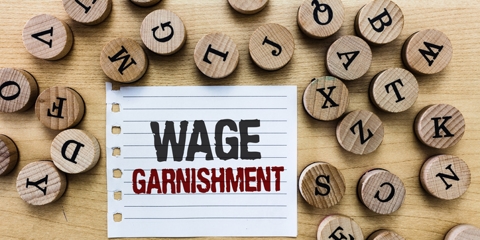Wage garnishment or wage attachment happens if you have fallen behind on bill payments and your employer decides to take money directly out of your paycheck and sends it off to creditors and/or collection agencies. This process can cause even more strain on your finances as you are not entirely in control of your paychecks. You still have rights while this process happens though and there are ways to reduce or stop the garnishment from continuing.
Reasons Your Wages May Be Garnished
Creditors will not garnish your wages right away if you fall behind on one or two payments. However, if your debt is approaching the statute of limitations, wage garnishment may happen. Before they can garnish your wages, most creditors will need to get a judgement from the court. The creditor can use this court order to request that your employer withhold part of your paycheck to cover debt payments.
What Wages Can Be Garnished?
There are federal limitations on which types of income can be garnished. The following are generally protected:
- Social Security disability
- Retirement funds
- Supplemental Security Income (SSI)
- Temporary Assistance for Needy Families (TANF)
- SNAP (food stamps)
- Veterans’ benefits
How Much Money Can Be Garnished?
The amount of money that may be garnished depends on the type of debt you owe. The limit is often just a percentage of your disposable income. For most consumer debt this total is the lesser of 25 percent or the difference between your disposable income and 30 times the federal minimum wage.
For child support and alimony, up to 60 percent of your wages may be garnished (50 percent if you have more than one child or spouse). Up to 15 percent of your wages can be garnished to repay federal student loans. Up to 15 percent of your wages can also be withheld for back taxes.
What Can You Do If Your Wages Are Being Garnished?
To learn more about your rights, it would be advisable to speak with a lawyer. You can stop your wages from being garnished by filing for bankruptcy. You can also decrease the amount that is taken out as well. Here are some options you can choose to stop or decrease wage garnishment:
- Negotiate with your creditor
- File a claim of exemption
- Challenge the garnishment (if the creditor did not follow the right protocols)
- Consolidate or refinance your debt
- File for bankruptcy
Can Filing for Bankruptcy Stop Wage Garnishment?
Fortunately, filing for Chapter 7 bankruptcy or Chapter 13 bankruptcy will immediately stop garnishment. The second your case is filed an automatic stay is imposed on the creditor and they will not be able to garnish you after your bankruptcy filing.
To learn more about how we can help you end wage garnishment, contact our Springfield bankruptcy attorneys online or at (417) 213-5006 to schedule a consultation.




